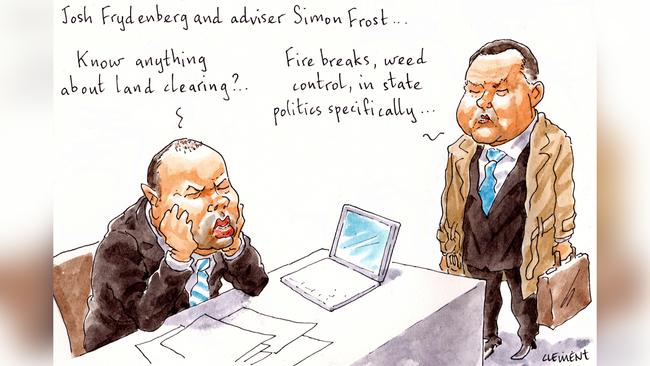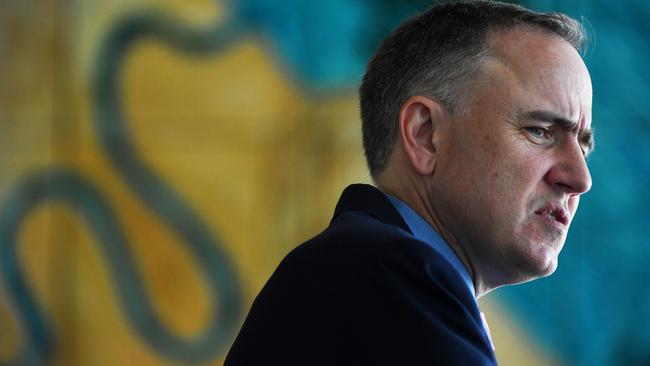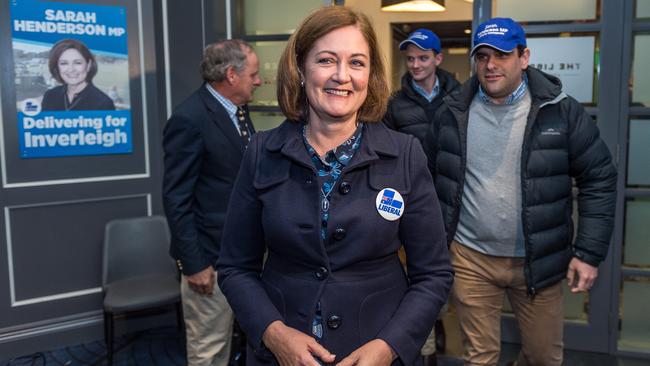Jacqui Lambie not short of advice on proposed tax cuts

Conspiracy theorists are going to have a field day with the office of pivotal crossbencher Jacqui Lambie.
Margin Call yesterday revealed Cameron Amos — once of The Australia Institute and more recently in Greens senator Sarah Hanson-Young’s office — has reunited with Lambie as the Tasmanian senator’s senior adviser.
Now we can reveal that’s only the half of it.
On our trip to Canberra for the opening of the 46th parliament, we’ve discovered that communications specialist Anna Bateman has also joined Lambie’s office from The Australia Institute.
The progressive think-tank’s well-connected executive director Ben Oquist (once Bob Brown’s former chief of staff) shouldn’t have too much trouble getting his foot in the office for a chat with the key senator.

Right now Lambie is set up as the determinative vote on whether Scott Morrison’s government will get to pass all of its $158 billion tax cut package.
Mathias Cormann is leading the government’s negotiations, assisted by his Senate adviser Jonathan Sharman (who he poached from the office of de facto Centre Alliance leader Rex Patrick).
The PM’s principal private secretary Yaron Finkelstein is also keeping an eye on things.
Oquist’s Australia Institute has argued for the third, $95bn stage of the tax package to be sent to a Senate inquiry.
Does Lambie — advised by Oquist’s former employees Amos and Bateman — agree?
Defence ‘chief’ search
Defence Minister Linda Reynolds continues to take a “top secret” approach to her incoming chief of staff.
But Margin Call has been reliably informed that the chosen candidate is not from, or in anyway related to, Christopher Pyne’s new employer EY.
Just as well. Pyne’s post-politics gig has caused enough grief for CEO Tony Johnson’s professional services firm.
Our encrypted mail is that a permanent chief of staff for Pyne’s successor in the plum national security portfolio has been chosen but is still to disengage from a current employer.
For now Scott Dewar — an acting deputy secretary at Defence, in charge of strategic policy and intelligence, and former adviser in Kevin Rudd’s PMO — is Reynolds’s temporary COS, as the new minister has navigated the Shangri-La security dialogue and beyond.
While the lead staffing role is still to be filled, the former Army reservist Reynolds’s office has received a few ticks from Tony Nutt and his “Star Chamber”.
Among their number is Harry White, who was previously a researcher at Peter Jennings’ Australian Strategic Policy Institute and more recently worked for professional services firm PwC (the employer of Pyne’s Adelaide-based rival consultant, Jamie Briggs).
White is also the son of Hugh White, one of the most influential security strategists in Australia, a former adviser to Bob Hawke and, like Dewar, a strategy deputy secretary at Defence.
Small world.
White the older has a new book out, which among other things argues for a $23bn-a-year increase to the defence budget.
That’s surely something EY, PwC and the plethora of other Australian defence industry consultants can agree on — although Treasurer Josh Frydenberg may take some convincing.
A fine bromance
Speaking of the beancounter, Josh Frydenberg has lured ascendant Victorian Liberal state director Simon Frost back into his Treasurer’s office.
Their bromance continues.
Special agent Frost — whose econometrics skills are legendary in Treasury circles — returns to Frydenberg’s office in September.
He will be a key adviser to the deputy Liberal leader, helping his boss navigate administrative mines and defuse factional bombs (no small task in the combustible Victorian division).
Frost was recalled to the Liberal machine role in a Christmas emergency after then state leader Matthew Guy was smashed by Labor’s Dan Andrews at the November election.
That redeployment — at the urging of his then boss Frydenberg, Victoria’s dominant Liberal — worked out well.
The state was a key battleground at the federal election in May.
Despite widespread forecasts of a massacre after the Turnbull coup, only two Liberals lost their seats, Chris Crewther in Dunkley and, despite a heroic effort, Sarah Henderson in Corangamite.

PM Scott Morrison was even able to raise money in Victorian blue blood circles to sustain the federal campaign.
Most notable was the $500,000 top-up from Charles Goode and the Cormack Foundation, which as Margin Call revealed was personally committed by Goode to the PM during a fundraising dinner at billionaire Anthony Pratt’s mansion, Raheen.
Open race at Caulfield
Before Simon Frost leaves, he has one more key assignment at 104 Exhibition Street: overseeing the Victorian Senate candidate race that will choose the successor to Mitch Fifield, who is off to be Scott Morrison’s man in the UN.
Former ABC journalist Sarah Henderson — whose recent campaign was run by Frost’s predecessor as state director, Nick Demiris — is currently the favourite to succeed Fifield, although a wide field is expected for the contest, which will be held at Caulfield racecourse on September 8.
Among the contenders is Karina Okotel, who assiduously raised her profile by cosying up to, and then spectacularly parting ways with, former president Michael Kroger.
But does she have the numbers?
Also tipped to join the race is Andrew Robb’s former chief of staff Zoe McKenzie, who was unsuccessful in her recent effort to replace Kelly O’Dwyer in Higgins.
McKenzie is certainly well connected with the departing senator, who appointed her last July to Ziggy Switkowski’s NBN board.
Three Liberals appear to have been struck out from contention: Adam Kempton, Joshua Bonney and Marcus Bastiaan.
Victorian Liberal president Robert Clark yesterday informed members that the trio were now the subject of motions by the administrative committee that would charge them as being “guilty of conduct gravely detrimental to the best interests of the party”.
Sounds ominous.
Party re-imagine
And what of Simon Frost’s replacement as Victoria’s state director? That’s far from clear.
But interestingly, Margin Call has heard that there has been talk among the sons and daughters of Menzies to re-imagine the administrative role.
Their model, if readers can believe it, is apparently Queensland’s LNP party structure, which elevates the role of the president, and then separates the subordinate state director and campaign director roles.
The logic of such a reform completely escapes us.



To join the conversation, please log in. Don't have an account? Register
Join the conversation, you are commenting as Logout